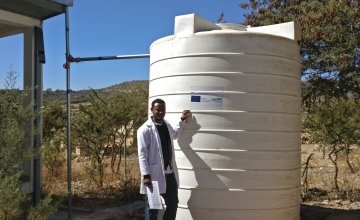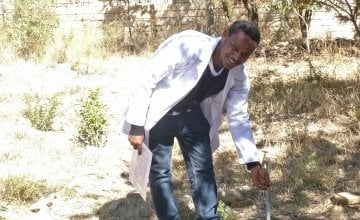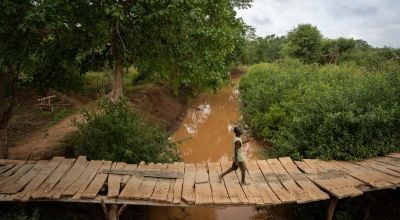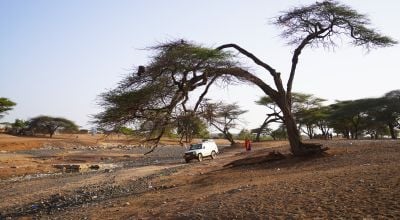
Read our 2024 annual report

Knowledge Hub
Clean and accessible water for health centres in Ethiopia

Water harvesting schemes, installed in health centres in Ethiopia by Concern and European Civil Protection and Humanitarian Aid Operations (ECHO), are providing a clean and accessible source of water for health staff and patients. Gedyan Tesfay, Director at one health centre in Tiku, Doga Temben describes the impact.
Reliant on unclean water from far away
As a result of the El Niño drought, water sources near our health centre in Tiku, Doga Temben had dried up. This meant that water had to be sourced from faraway reserve areas in jerry cans. As the health centre had no access to a vehicle, water had to be transported using donkeys and often took a long time to arrive.
We required a minimum of 20 jerry cans per day, meaning there was insufficient amounts of water, and to make matters worse, the water was unclean."
Availability of accessible and clean water
When Concern began working in the area, the support provided led to significant changes to the challenging situation staff were facing. Rainwater harvesting schemes were installed in a number of districts in the Tigray region of Ethiopia, Doga Temben being one. The scheme works by collecting rainwater from the corrugated iron roof of the health centre, this water flows along a pipe and into a 10,000 litre capacity tank. The water is treated with chlorine making it a clean source of water suitable for use by health staff for handwashing, cleaning instruments, hygiene promotion demonstrations etc.
The health centre staff in Tiku now have a sufficient supply of clean water to enable them to carry out their job."

Maintaining and managing water
To ensure the water tanks are properly maintained, Concern provided training to two staff members at the health centre. They are responsible for checking the pipes daily, cleaning the tanks and for reporting any technical issues to the district level water experts. Health staff have also been trained on the correct management and usage of the water.
It is clear staff have not forgotten the hardship and difficulty in obtaining water before Concern arrived, as a result they are adhering to the training and using the water wisely."
Looking forward
If staff continue to use the water according to the guidelines provided during the training, the reserves should be sufficient until the next rainy season in June 2018.
Learn more about Concern
Learn more about the diversity of our work in 26 countries worldwide.
In depth





